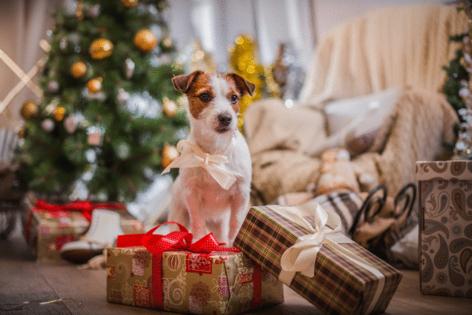Holiday hazards: How to be cautious of holiday items around your pup
Published in Cats & Dogs News
It’s the holiday season and we want to remind you that during all the festivities this wonderful time of the year, do not forget the safety of your pets.
During my many years heading Chicago’s largest veterinary emergency center, the winter holidays were consistently the busiest time of the year. Our curious pets find all kinds of ways to get into trouble and sometimes the outcome is tragic. This time of the year brings many hazards for our pets, including unhealthy or even toxic foods, alcohol, plants, decorations and visitors.
We urge you to be cautious with what your pup gets into this holiday season.
Food
While many people are aware of the dangers of certain common foods, they don’t always think about the different ways and forms dogs may consume them. The following foods should be avoided.
Most chocolate toxicity ingestions are due to dogs eating chocolate candy, chocolate chip cookies or brownies. Raisin and nut toxicities are often in the form of dogs eating chocolate containing these ingredients.
Onions and garlic are also toxic to dogs, from raw to cooked. These vegetables and herbs can cause gastrointestinal irritation and could lead to red blood cell damage and anemia.
Fatty, sweet and spicy foods like ham or buttered foods can affect digestive tracts of many dogs causing diarrhea, vomiting and in some cases can progress to a life-threatening condition called pancreatitis.
Cooked turkey bones can be dangerous to our pets. They are brittle and can pierce or obstruct the esophagus, stomach or intestines. Small pieces of skinless and boneless turkey are usually fine for most dogs in moderation.
Xylitol is used as a sweetener in many products, including many sugarless gums and toothpaste. Xylitol may also be present in many baked goods and candy. It can cause insulin release in most species, which can lead to liver failure. Initial signs of toxicosis include vomiting, lethargy and loss of coordination. Signs can progress to seizures. Elevated liver enzymes and liver failure can be seen within a few days.
Yeast dough can rise and cause gas to accumulate in your pet’s digestive system. This can be painful and can cause the stomach to bloat, and potentially twist, becoming a life-threatening emergency.
Alcoholic beverages and food products containing alcohol can cause vomiting, diarrhea, decreased coordination, central nervous system depression, difficulty breathing, tremors, abnormal blood acidity, coma and even death. Under no circumstances should your pet be given any alcohol. If you suspect that your pet has ingested alcohol, contact your veterinarian or the ASPCA Animal Poison Control Center immediately.
Raw meat and raw eggs can contain bacteria such as Salmonella and E. coli that can be harmful to pets and humans. Raw eggs contain an enzyme called avidin that decreases the absorption of biotin (a B vitamin), which can lead to skin and coat problems. Feeding your pet raw bones can be very dangerous. They might choke on bones, or sustain a grave injury should the bone splinter and become lodged in or puncture the digestive tract.
Plants
Poinsettias are widely known to be toxic to dogs, but they just make a dog mildly sick with mild to moderate stomach issues like vomiting and salivation. Holly, mistletoe and bulb plants like amaryllis are more concerning as they can cause gastrointestinal upset and cardiovascular problems if ingested by pets.
Lilies that are typically found in holiday bouquets are highly toxic and can cause kidney failure in cats. If there are cats in the house, there shouldn’t be any lilies of any form in the house, either in plants or bouquets. All parts of the lily plant can be deadly to cats.
Decorations
You may have more festive décor out this time of year, and anything new is enticing to curious pets.
To keep pets safe from the danger of holiday decorations:
--Make sure the tree water is covered and/or inaccessible to curious pets. Tree water is a breeding ground for bacteria that could cause nausea, diarrhea or stomach upset. Remember to also clean up any fallen pine needles to make sure your pup does not ingest any.
--You can’t see the contents of a wrapped present, but pets might smell it. Be sure to keep wrapped food or candy off the ground!
--Never leave any lit candles unattended with pets. Curious paws and happy wagging tails could knock them over, potentially burning your pet or starting a fire.
--Snow globes are made with ethylene glycol, the same chemical used in antifreeze, which is highly toxic to all pets. If a snow globe breaks, the sweet smell can attract pets to taste it, leading to potentially fatal intoxication. Be sure to keep snow globes away from pets and thoroughly clean up any accidental breakages.
Guests
Guests often leave open purses or suitcases around with plastic bags of unmarked medications or drugs. Tell your guests to keep all medication safely put away. Keep purses and suitcases closed and out of paws’ reach.
If you suspect your pet has been exposed to any poisonous substances, please contact your veterinarian or call Animal Poison Control Center (APCC) at (888) 426-4435 immediately.
We hope you and your pets have a safe, happy and enjoyable holiday season….and stay out of the veterinary emergency room!
©2024 American Kennel Club. Visit at akc.org. Distributed by Tribune Content Agency, LLC









Comments